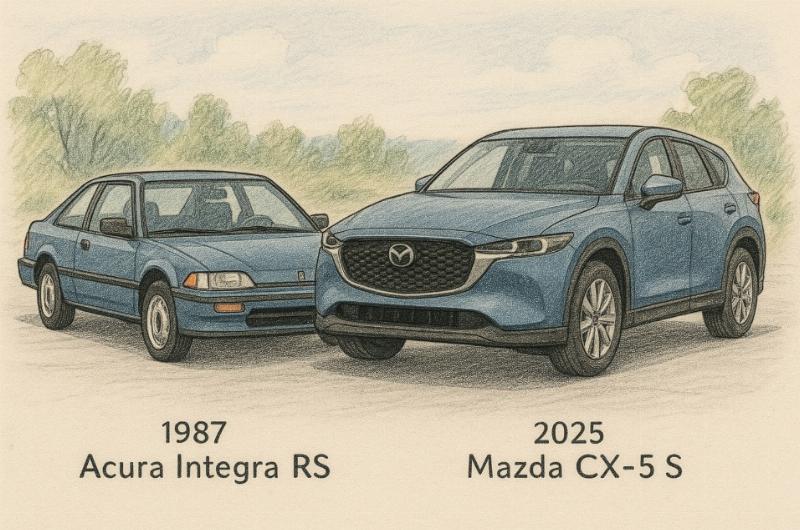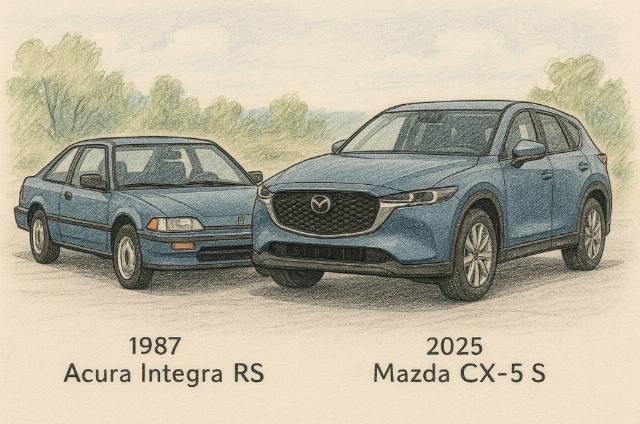


I received a solicitation in the mail today for a brand-new Mazda CX-5. It’s a lovely car (I like Mazdas), and it put me in mind of my first new car, a 1987 Acura Integra RS 3-door hatchback. Funnily enough, the thirty-eight years between these two cars—and the immense improvement in quality over that time—forcibly reminded me why there is a gaping chasm of happiness between Democrats and conservatives. Stick with me as I take you on a ride.
My father was raised in a single-parent home in a German Jewish Berlin slum in the wreckage of World War I. (You can read a little about his youth here.) He and Mom (legally) immigrated to America before I was born, and he scrabbled for a living. He simply had no knack for making money.

Image by ChatGPT
Naturally, they never owned a new car. When I commuted to college, I drove an old Volkswagen that routinely broke down. When I moved to Texas for law school, the fact that it had no A/C was unpleasant. It became even less great when the heating system broke, remaining stuck in the “on” position for my last year.
No wonder that, once I started my first “real” job as a lawyer in 1987, I rushed out and bought a new car. However, because I had no savings (plus I had student loans), I bought the cheapest, but still reliable car I could find.
That car was the aforementioned Acura Integra RS, with a 113 hp engine and a 4-speed automatic transmission. It had no radio, A/C, or airbags (this was 1987). The entire safety system was the three-point seat belt. The seats were cloth, and the windows and locks were manual. It was a very basic car, and cost $11,000.
Today, $11,000 seems like incredibly for a car. However, adjusted for inflation, that’s roughly equivalent to $31,415 today—and that amount, coincidentally, is the price of the Mazda CX-5 at our local dealership. Here’s what you get today for the equivalent of $11,000 in 1987:
The CX-5, which is twice as large as the Integra, has a 187 hp engine with a 6-speed automatic transmission and all-wheel drive. Its 10.25” infotainment display works for both Apple and Android, and plays AM and FM radio stations.
It has front and side airbags, adaptive cruise control (so you never get too close to the car in front of you), lane-keep assist, blind-spot monitoring, and back-up warning systems. It has total climate control (as opposed to just blasting hot and cold air). There are a host of other features, but that’s a start.
Thinking about the staggering difference between those two comparably priced cars made me think about all the other material ways in which life today is better than it was forty years ago.
Forty years ago, an office was a secretary, a phone, an electric typewriter, and a photocopier. Over the years, offices added fax machines, computers, printers, and the internet. Now, we have all that at home and most of that (except the printer) in our pockets.
And think how simplistic medical treatment was just forty years ago compared to what it is now, both at the diagnostic and treatment level. And yes, there is malpractice, modern medicine can be abused, and the pharmaceutical industry seems to have run amok, but for the most part, we are living longer, healthier lives than ever before in human history. To the extent we’re dying younger, it tends to be self-inflicted wounds of despair (drugs, suicide) or cultural damage (murder).
Look around your home and contemplate every gadget, device, fixture, and product in it: The toilets, sinks, drains, washing machines, refrigerators, vacuum cleaners, TVs, computers, light fixtures, masses of clothes, toilet paper, cleaning supplies, and on and on. Generally speaking, we in America have lives that are cleaner, healthier, wealthier, safer, more comfortable, and more affluent than any other people in history, royalty included.
And yet, as Joseph Ford Cotto wrote, Americans—especially Democrats—are not happy. He writes that “Mental health matters. Happiness matters.” He’s absolutely right.
And as much as anything, happiness is a choice. Because I’m a history major and both my parents had really appalling life experiences, I have a strong understanding of how bad it can get. Even that knowledge, though, didn’t save me from unhappiness.
What saved me was shifting my ideology from left to right. That’s because, with that shift, I changed from being someone defined by blaming others to someone who tries to define my life by gratitude. I’m grateful for what I’ve got, what I can do for myself and others, the people who are in my life, whether fixed (family and friends) or transient (the nice clerk at the drugstore or the neighbor who waves hello). I made the choice.
As a leftist, my anthem could have been Stephen Sondheim’s Your Fault from Into The Woods:
As a conservative, I try to shape my life around Benny Friedman’s Todah (Thank You), a song of gratitude for the blessings that define my life:
My job is to grumble about what’s wrong, and I’m deeply worried about the situation in Israel, but I never lose my focus on what’s right, especially in Trump’s America, because that’s what carries me through every single day.
And honestly, every day, when I get in my car in the South Carolina heat, I’m so darn grateful for the air conditioning.
